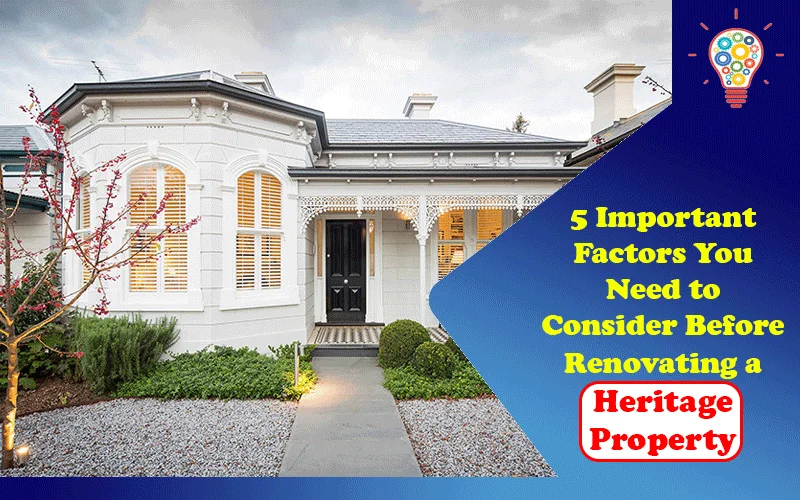If you own a historic home or any old property, you know that it comes with challenges. These days, property owners want their homes to be customized to their needs and therefore will consider a major heritage home restoration in Adelaide to bring their dream home to life.
However, renovating a heritage property is different from renovating a recently built house built for a number of reasons. Let’s look at what five of them are. That way, you can go about your renovation the right way and enjoy your home for years to come.
Table of Contents
1. Learn about the regulations applicable to your property
As the owners of heritage properties may already know, there are laws and rules governing renovations to historic homes. These laws are designed to preserve our community’s history as well as protect the tangible heritage inside these homes. Still, it can be a bit of a shock to owners, who think of their homes as theirs exclusively.
Regardless, it’s essential to understand these rules before tackling any kind of renovation project. They may dictate what types of upgrades can be made, what materials can be used, and construction and building methods.
One thing that can significantly help navigate these regulations for a project such as this is hiring a knowledgeable contractor. We’ll look at that next.
2. Hire a knowledgeable contractor and team
One of the most important things that you must do is hire an expert. While many contractors and builders claim to know what they’re doing with heritage properties, it is important that they truly understand the ins and outs of this intricate process.
Be sure to have an open and honest conversation with any potential contractors. Ask for references for heritage properties they’ve worked on in the past, especially if those properties are from the same era as your own.
Your contractor should be able to walk you through the process every step of the way. They should assist with obtaining the proper permits, permissions and suitable materials. Some contractors who specialize in heritage properties have connections to antique dealers and can source the right contemporary materials.
Of course, anyone you hire should be fully bonded and insured. Make sure you also establish open lines of communication early on, so read through and discuss your contract as well as cost estimates for the job.
3. Have a vision for the end product
Once you understand the rules that control what you can and cannot do with your historic home and have found your team of professionals, it’s time for the fun part; making plans for your home’s transformation. However, while you’re doing so, it is imperative to have a clear vision guiding you for how you want your home to look and feel when the project is complete.
When restoring or renovating a heritage property, different people seek very different outcomes. Some homeowners would wish to restore their home very closely to how it looked when it was built, with the same kind of woodwork and materials – just like stepping back in time. While others might want to modernize the space by creating an industrial look, which is very possible to do in a heritage property. They would then emphasize exposed brickwork and even remove walls and ceilings to reveal antique piping. There are also homeowners who opt for blending the two, which is especially common in craftsman-style homes.
Having a solid idea on the end product will guide every decision you make along the way and guarantee that you’ll love the atmosphere as well as style you create in your home. Most importantly, be sure to retain some of the charm and character that make your home unique.
4. Make a budget and stick to it
Anyone who has been through a home renovation, especially a heritage home restoration in Adelaide, knows that it can get costly very quickly. For one thing, your dreams may not align with your reality. There might be things that you really want but are entirely out of your price range. You also may need to make some tough choices about what is most important to you and your family. Most budgets can’t cover every change that homeowners desire. Think about the long-term and how your family’s needs will change over the coming years.
Make sure you discuss your budget carefully with your contractor. This includes making plans for contingencies and how those will be handled. What sort of challenges are they anticipating? Which have they seen in the past? Is there money set aside for these kinds of things?
In addition, whether or not you think you’ll sell in the near future, it’s still essential to think about what future buyers may want. Making radical changes or drastically modernizing the property can cause it to lose value.
Deviating too much from your budget can completely ruin the project, as well as your ability to enjoy it once it’s complete. Avoid the pitfalls of spending too much by planning as carefully as possible.
5. Do the least amount of harm possible
Heritage properties are very different from more modern structures. They were built with older materials and methods, and for that reason, every change you make has to be sustainable. It’s even more important to use natural, high-quality materials in your heritage property renovation. This is another reason why hiring knowledgeable contractors and builders for your project is so important. With knowledge on best and sustainable materials as well as practices on hand, you can protect your home in the long run.
Regardless of the type of restoration or renovation project you’re considering, the important thing is that you love the final product. Creating a comfortable and conducive home is an enjoyable process and one that you can benefit from for years to come.
Read Also: 7 Things to Consider Before You Begin Zeroscaping

